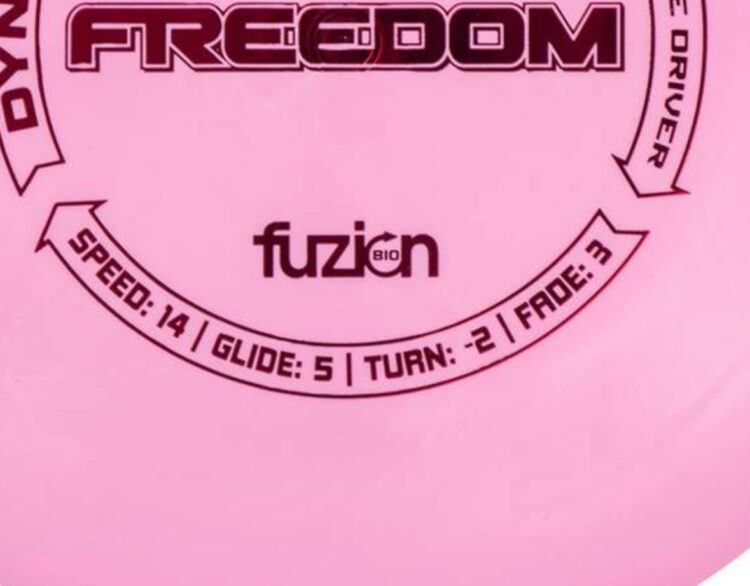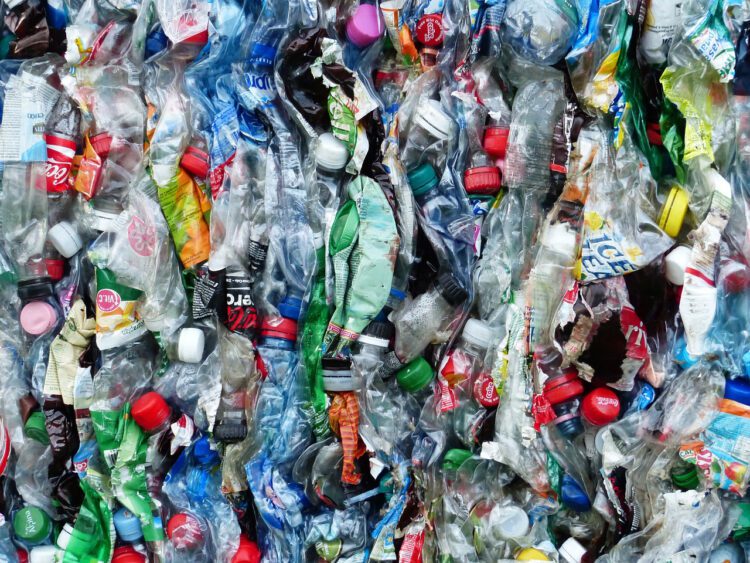Disc Golf X-Outs, Misprints and Factory Seconds

In this post we will cover what these terms mean, how they are used, and how to find those kinds of discs. In disc golf, factory seconds, x-outs, and misprints are basically discs that didn’t make the cut for regular retail sales, for a variety of reasons. These discs are typically of good quality, but may have small defects that make them unacceptable for “normal” sale.
X-Out Discs
X-out disc golf discs (also known as factory seconds) have slight factory defects that don’t meet manufacturer standards. Because the quality of these discs is not good enough to be sold at full price, you can save some money by purchasing factory second discs.
Reasons Discs Get Classified as X-Out Factory Seconds
There are several reasons why certain discs get classified as factory seconds. The most common defects come from unwanted air bubbles in the rim, black specs that somehow end up in the disc, small bumps, gouges in the rim, and errors in color configuration.
- Air Bubbles
- Poor Flashing Removal
- Unusual indentations in rim
- Excessive dome
- Puddle Top
- Wavey Flight Plate
- Foreign Particles in the Plastic
With certain factory seconds, it’s baffling why they didn’t meet manufacturer standards because they appear identical to their full-price counterparts. Manufacturers sometimes detect minor imperfections in a batch, leading them to classify the entire lot as X-Outs, even though many discs within it are perfectly sound. It’s a bit of a mystery sometimes, but for you it means snagging a great deal on discs that might be virtually indistinguishable from the regular ones.
Downside of Factory Second Discs
Factory second defects are primarily cosmetic and are not supposed to have a significant effect on flight characteristics or durability.
With that said, some factory second defects do substantially alter the flight of the discs. If you notice a visual bulge, extra dome, or indention in your factory second disc, this disc will fly a little bit differently than the unblemished variety. For this reason, buying factory seconds is not always the best if you’re looking to replace a disc with a specific flight path.
To make things slightly more confusing… When golf discs have serious defects that will alter flight, manufacturers like Innova and Latitude 64 recycle and regrind the plastic rather than try to resell blemished discs. Discs made from this “recycled plastic” are sold as a unique plastic blend called “echo star” or “recycled.” These discs aren’t actually factory seconds, they are simply a different plastic blend made from recycled materials — and usually priced less.
We do carry several recycled discs available for sale. This plastic is an option for many of the common Trilogy Discs. These plastic types are known respectably as “recycled”, “reprocessed” and “Bio Fuzion” and are found under the individual disc pages. Infinite Discs I-Blend plastic is made partially of recycled plastic parts.
Click this link to search from our assortment of X-Out Factory Second Discs

Misprint Golf Discs
Misprint discs meet manufacturer standards during production, but the flaws occur during the hot stamping process. In many cases these discs are stamped multiple times. The Infinite Discs Sphinx (below) was stamped multiple times.

In other instances, the foil didn’t set properly and created a flaw in the print. Sometimes these print blemishes are very minor, such as a partial stamp. Once in a while, discs are simply given the wrong stamp. While it may have the Ape stamp, it’s actually a Valkyrie. Always look at the handwritten or engraved disc name on the bottom of the disc to determine the actual mold.
The reality is, after a few throws disc stamps are going to get scratched anyways. Discs that are double stamped are unique, and sometimes create even more impressive artwork. Some double stamps give a 3D look to the stamp.
If you’re the type of person that likes high quality discs, but not high prices, misprint and factory seconds are your best bet to save some money.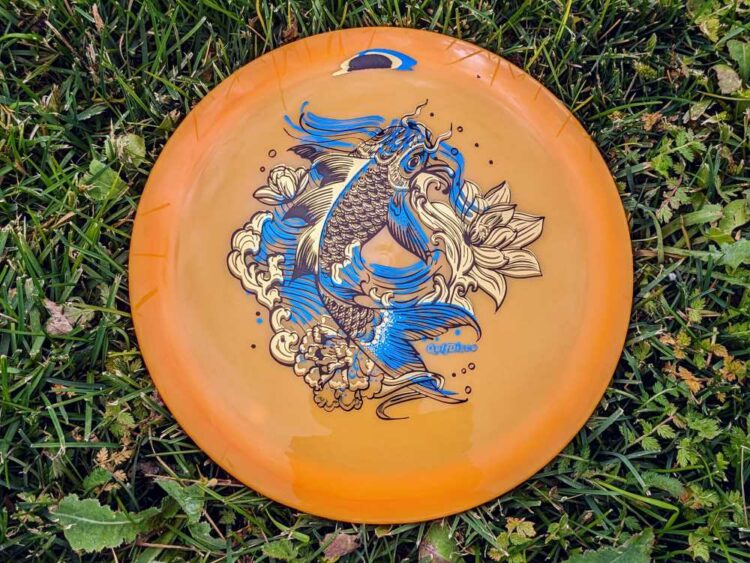
Best Way to Find Misprints and X-Outs for Sale
When adding products to InfiniteDiscs.com our employees have a field called “additional input” where they label additional information about each specific disc they manually add to inventory.
If the factory second disc also has a special “Factory Second” stamp, it will also be found under our Factory Second Stamp type page here.
We have a large team and because it is humans who do our inventory adding errors do occur. It is not uncommon for you to find misprints or x-outs that were not labeled and are found in other locations on our website. In general the “plastic type” (and lower price) will help you to determine if the disc is indeed an X-Out.
For consistency and ease of entering the data, we enter all misprints or factory second discs into our system with the term “x-out” listed after the plastic name in the plastic type field. If you see the plastic type is “Star x-out”, then the price has been discounted and the disc you will receive is a misprinted or factory second version of Star plastic.
To view the misprint and factory second golf discs we have on our “additional input” and stamp type pages, the links below will take you directly to all the search results.
Another way to find X-Outs on InfiniteDiscs.com is by using our “Advanced Discs Search”
Under “Stamp” you can select “X-Out Factory Second” and then narrow down your factory second search by disc brand, type, color, or flight ratings. (Note: We don’t always enter in the stamp type properly, so while this search can pull up some specific misprint discs, not all factory seconds will necessarily show up under this search.)
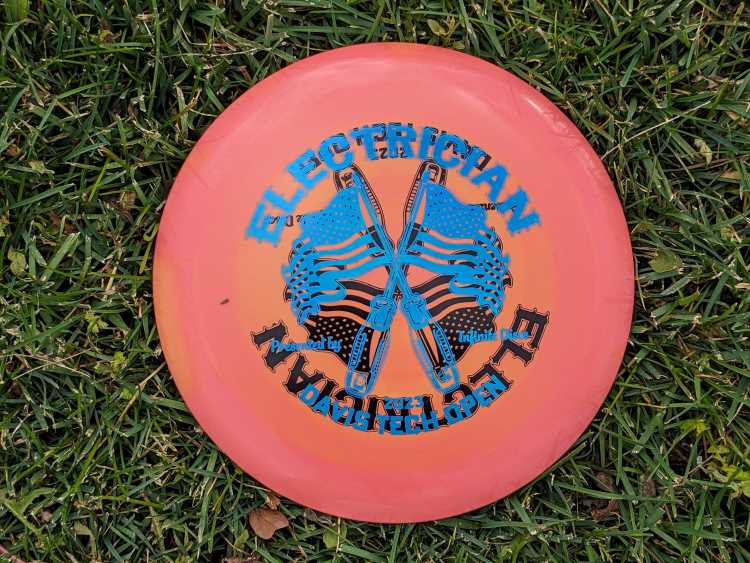
Why Should You Buy X-Outs and Misprints?
Price
There are a number of different reasons to buy Factory Second, X-Out, and Misprint Discs. The primary reason is price. Because of the manufacturing or stamping errors, you get a price break.
Disposable Discs – That aren’t heart breaking to replace
Factory Second discs are your go-to when you’re not a stickler for a specific flight path. They’re perfect for those days when you just want to hit the course without worrying too much about precision. These discs shine as “disposable discs”, or discs that you don’t care as much is you lose. Especially if your regular disc golf playground is adorned with water hazards or dense vegetation. Losing one won’t break the bank, and you won’t lose sleep over it either.
Great for Practice
Picture this: you’ve found your favorite molds, and you’re itching to hone your skills on the field, but you don’t want to spend a fortune buying multiples of that mold. Enter Factory Seconds. Why buy one when you can grab a bunch? Load up with 10 Factory Seconds, and you’ve got yourself the perfect arsenal for field work and practice sessions. It’s cost-effective, efficient, and lets you focus on perfecting your game.
Character and Collectability?
On the other hand, Misprint discs offer a different kind of charm. The visual quirks and unique misprints give these discs character. And let’s be honest, who doesn’t want a disc with a story to tell? Misprints are the way to go when you’re more about saving money than obsessing over the visual aesthetics of your disc. Misprints, being one-of-a-kind, frequently command high prices in the secondary collectors market.
The best part? Misprints maintain the same flight characteristics as their full-priced counterparts. So, when you’re tackling courses where disc loss is practically inevitable, these are your saving grace. You get to keep your “go-to” without breaking the bank or your heart when it takes an unexpected detour into the unknown.
In a nutshell, Factory Second and Misprint discs are the savvy disc golfer’s secret weapons. They’re practical, economical, and add a dash of personality to your game.
Frequently Asked Questions
Are Infinite Discs with double stamps x-outs or misprints?
They could be both, but most of the times a double stamp will be a misprint. If there is a stamping error where there was dropout or the disc wasn’t wasn’t aligned properly, to ensure that our inventory team knows it’s a misprint, the stamp team simply stamps the disc again a second time. Other brands like Dynamic Discs seem to do the same thing to signify a misprint.
What does X Out mean in disc golf?
X-Out is simply a term used for a factory second. There is no universal term used among the different disc golf brands so in some cases the terminology will vary. When Innova manufactures a disc that doesn’t meet their quality guidelines, they manually mark it with an X on the top of the flight plate. An X-Out is a disc that meets the criteria for sale but falls short of the full retail standard, resulting in a discounted price and designation as an X-Out.
How can I tell if an X-out Infinite Disc is actually just a Misprint?
When we get factory second discs from Innova, they are always marked with a small X on the top of the flight plate. While we often stamp these F2’s with fun stamps, the X marked underneath the stamp indicates that the disc didn’t pass the manufacturing guidelines.
The nice thing is that whether it’s a factory second or a misprint, it’s always going to be less expensive than the blemished version. 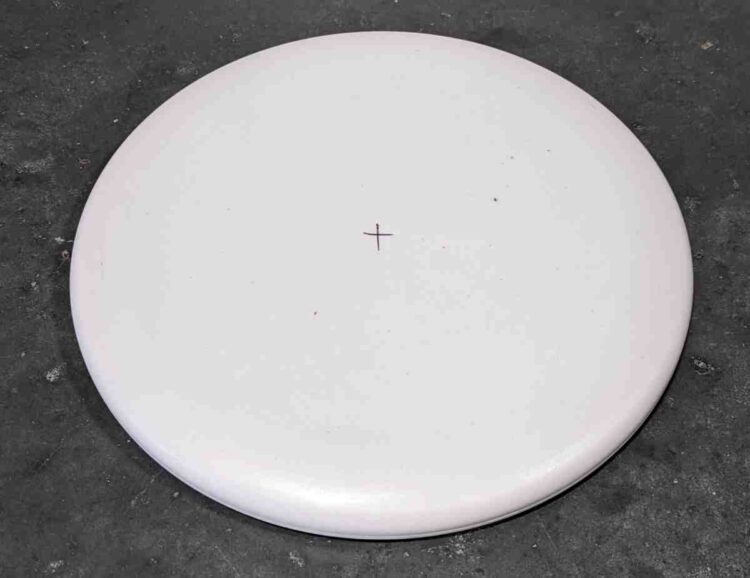
Are MVP “Factory Misprints” factory seconds or Misprints?
MVP has two different blemished discs stamps that they use. When the discs has the “lab seconds” stamp, it is a manufacturing error.
When the discs have the “Factory Misprint” stamp, from what I can tell, these are misprint errors rather than manufacturing. MVP’s 3 foil machine has a very high dropout rate and so the rate of misprint MVP discs seems to be higher than with other brands.
Because MVP does the second “factory misprint” stamp on top of the original fallout stamp, it’s sometimes hard to see the original stamp blemish. This is the case for MVP, Axiom, and Streamline discs I’ve observed.
Are Factory Seconds as durable as other discs?
Yes. At least usually. Factory second discs share the same plastic variations as their standard counterparts. However, there are instances where manufacturers may switch between plastic varieties, resulting in occasional differences. These unique blends might not match the durability of pure polymers.
Are Factory Seconds PDGA Approved?
Yes. Factory Second discs are PDGA approved, meaning they meet the standards set by the Professional Disc Golf Association for disc golf size, weight, dimensions, and flexibility. While factory seconds may have minor cosmetic blemishes or variations, their approval shape aligns with the regulations, allowing disc golfers to confidently use them in PDGA-sanctioned events without any concerns about compliance. If a disc a manufacturer makes will not align with PDGA standards, then they should not release them to the public.
What is an Innova F2?
Innova often uses a F2 stamp on their factory second discs. The Innova F2 is not actually a disc but can be any number of Innova discs that are signified as factory seconds. We often get confused customers who receive a disc with an Innova factory second stamp and wonder what disc the Innova F2 is.
Why are there so many Misprints?
The hot stamping technique employed in disc golf is grounded in rather dated technology, with few companies producing hot stamp machines today. At Infinite Discs, both machines in use are actually refurbished units from the past. This method relies on a marriage of temperature and pressure to bond foil to plastics.
Aligning the stamping process is no small feat due to the diverse shapes, dome varieties, and plastic options of each disc mold. The intricacies don’t stop there—different foil types react distinctively to various plastic compositions, and variations in flight plate thickness demand constant adjustments. Setting up our hot stamp can be quite a process, often taking up to half an hour, involving ample trial and error and lots of painters tape to find that sweet spot where the disc stamps just right, applying the correct pressure without any dropout. It’s a meticulous process to achieve disc stamping perfection. This is the reason there are so many misprints in disc golf.
Why do some discs have double or even multiple stamps?
Stamping discs is a bit of an art. When our creative team at Infinite Discs set up the stamp machines, they often use a factory second disc for practice runs. It ensures the settings are spot-on and that each stamp plate hits just right before pulling out the full price discs. This is why you might spot certain stamps on factory seconds that don’t match the actual disc. It’s also another reason you can get some unique collectable discs by shopping through X-Outs.
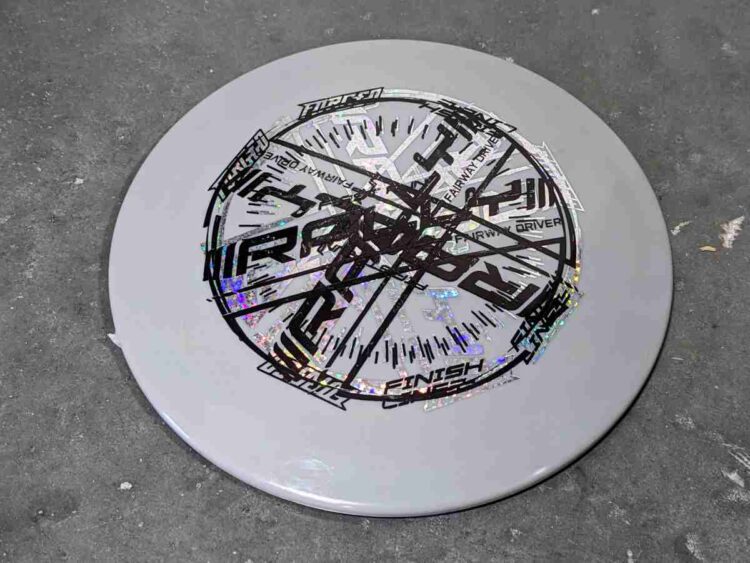
What Brands Does Infinite Discs Stamp?
We hot stamp a number of different disc golf brands in house which may result in misprint discs. We stamp all or almost all the discs for the following brands:
- Infinite Discs
- Finish Line Discs
- Dino Discs
- Wing-It Disc Golf
In addition to stock stamps, we also have many of these discs available as blanks for event and tournament sponsorship. Because we do all the stamping for these brands, there is a good chance that we have actual misprint discs for them.
We also do special runs and stamping for certain molds for the following brands. When we do custom stamping “in house” we will likely have at least a few hot stamping errors where these products will be listed as misprints. If you find a three foil stamp version of any of these brands, we likely did the hot stamping.
- Birdie Disc Golf
- Clash Discs
- Discmania
- Discraft
- Doomsday Discs
- Dynamic Discs
- Divergent Discs
- Kastaplast
- Latitude 64
- Legacy
- Lone Star Disc
- MVP
- Prodigy
- Prodiscus
- RPM Discs
- UPlay
- Viking
- Wild Discs
- Yikun
Conclusion
Factory seconds or x-outs, with their slight defects, offer an affordable alternative for disc purchases. Misprints add character with flaws arising during the stamping process. Our guide has not only explains the nature of these discs but also provides practical insights into finding and purchasing them. From economic advantages to suitability for practice and the allure of collectability, factory seconds and misprints emerge as valuable choices for players, practitioners, and collectors alike. Delve into the world of disc golf X-Outs and misprints with our easy to search pages on InfiniteDiscs.com.

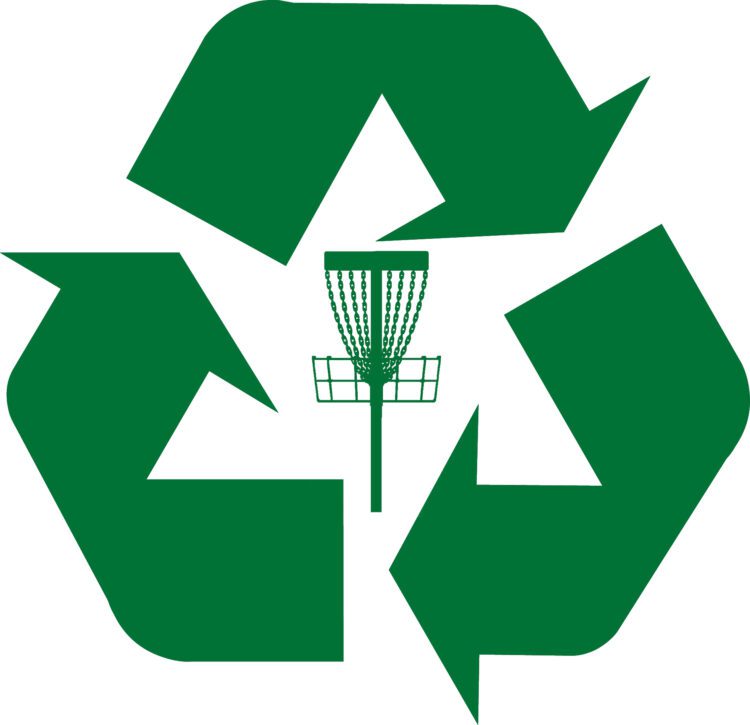 Today’s disc golf discs come in a variety of colors, shapes and materials, and most are made with some kind of plastic. Synthetic plastic has been around for over a century and has shaped the way we live. However, this amazing invention does come with some baggage. First, most plastic is made from crude oil or other non-renewable resources. And second, it does not easily break down, meaning it will be around for a long, long time.
Today’s disc golf discs come in a variety of colors, shapes and materials, and most are made with some kind of plastic. Synthetic plastic has been around for over a century and has shaped the way we live. However, this amazing invention does come with some baggage. First, most plastic is made from crude oil or other non-renewable resources. And second, it does not easily break down, meaning it will be around for a long, long time.